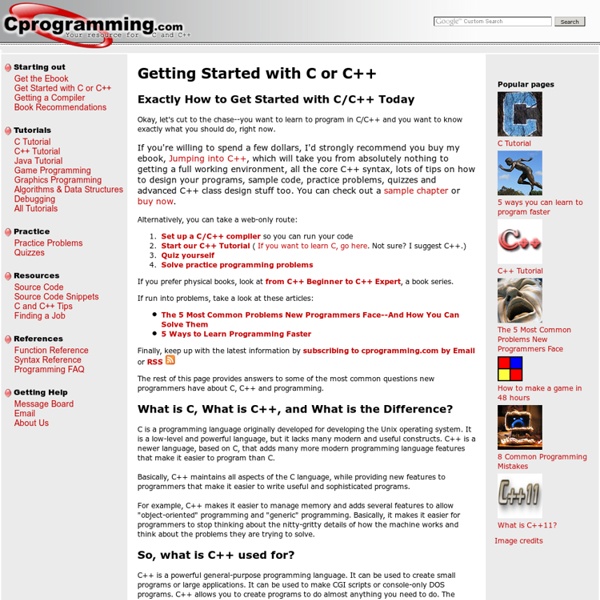How to Get Started with C or C++

Best free C and C++ programming courses online
Custom Search In the previous article I compiled a list of C and C++ Programming websites/tutorials that could help you learn basic and advance techniques in programming. Today’s article shows you a list of C and C++ programming courses freely available online on different university websites in the form of OpenCourseware . OpenCourseWare is a term used for course materials created and made freely available online by universities. I suggest taking these free courses even though they won’t gain you a well recognized qualification or degree. You can find complete listing of courses offered by different universities at OpenCourseWare Consortium website. Practical Programming in C course provides a thorough introduction to the C programming language, the workhorse of the UNIX operating system and lingua franca of embedded processors and micro-controllers. University of Cambridge Department of Engineering offers a beginner’s resource for starting C++ . There are No Comments to this post.
C Tutorial
The C is a general-purpose, procedural, imperative computer programming language developed in 1972 by Dennis M. Ritchie at the Bell Telephone Laboratories to develop the UNIX operating system. The C is the most widely used computer language, it keeps fluctuating at number one scale of popularity along with Java programming language, which is also equally popular and most widely used among modern software programmers. This tutorial is designed for software programmers with a need to understand the C programming language starting from scratch. This tutorial will give you enough understanding on C programming language from where you can take yourself to higher level of expertise. Before proceeding with this tutorial, you should have a basic understanding of Computer Programming terminologies. For most of the examples given in this tutorial, you will find Try it option, so just make use of it and enjoy your learning. 1 - C Programming Quick Reference Guide C Programming Quick Reference Guide
C++ Programming/Exercises/Iterations
Iterations[edit] Solutions requirements Solutions must: Use only standard C++.Be compilable.Be in accordance to general coding practices. (no esoteric demonstrations are required) and should: Handle error situations, even if behavior is not defined. Please do not add solutions that are 99% similar to another that is already present, if it is an improvement just add it to the existing solution. EXERCISE 1[edit] Write a program that asks the user to type an integer and writes "YOU WIN" if the value is between 56 and 78 (both included). int main() {int i; cout << "Type all numbers between 58 and 73: " << endl; cin>>i; if (i>=58 && i<=78) { cout << "YOU WIN" << i << endl; else cout<<"YOU LOSE!" EXERCISE 2[edit] Write a program that asks the user to type all the integers between 8 and 23 (both included) using a for loop. Solution Alternative solution by Bartosz Radwanski Alternate solution Solution in C Another alternate solution Failed solutions (correct them as an extra exercise) EXERCISE 3[edit]
Related:
Related:



